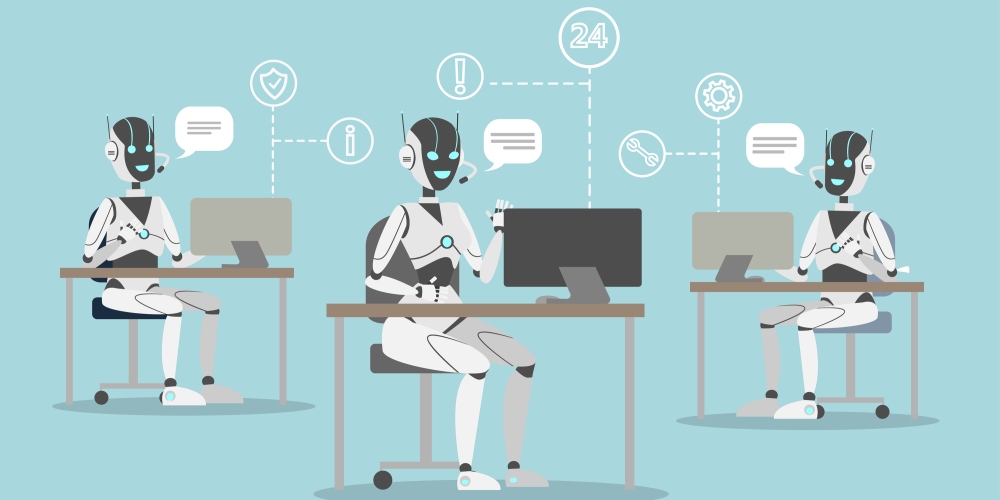With changes happening to digital technology at lightning speed, one of the most impressive developments is the advancement of Artificial Intelligence (AI). The use of AI in certain automated systems has brought about a revolution in terms of lowering costs while improving efficiency. The AI or machine learning process is even reaching out to call centers, which have been the bastion of human interaction between companies and customers for many years.
With more companies outsourcing their customer service and call center requirements to BPOs in locations such as the Philippines, the concern is whether AI will suddenly take the place of having a person on the other end of the phone. However, it is important to understand exactly what artificial intelligence is, how it benefits customers in a call center, and whether it will really take over the industry.
What is Artificial Intelligence?
Although seemingly relatively new to the world, AI was a term coined in 1955 when scientists at the Dartmouth Workshop were looking for ways to improve machine learning. From solving issues to understanding languages, concepts, and abstractions, AI has progressed a long way from the early days of computer science.
Today, AI has become an important part of the digital technology revolution. By allowing for automation to take hold in certain areas, artificial intelligence is being used not only as a labor-saving technology, but also in improving the efficiency of many different services. AI is being used by search engines to help people find what they are looking for faster and many other areas as well.
This includes call centers where AI has made some remarkable contributions that have made the customer experience better for both customers and call center employees. What was once simply a trained employee on the other end of the line has become something far greater.
Benefits of AI to Call Centers
There are many behind-the-scenes benefits that this type of technology has brought to customer service departments. Arguably the most notable is how it assimilates information over time to help establish patterns which can be addressed more readily. This means that the process becomes more efficient overall. However, there are other benefits that AI offers.
Streamlines the Process: Arguably the most important contribution that this type of digital technology has made is to help streamline much of the process involving customers getting information from companies. From putting together answers to frequently asked questions to directing people to the right places, AI has made important contributions in terms of speeding up the entire call center process.
Grasps Technology: The addition of AI has helped to reduce the learning curve for employees who are working with customers on a daily basis. This means that artificial intelligence is handling a considerable amount of detail and information that otherwise would be incumbent on the call center staffer to learn on their own. In other words, the fewer hoops that have to be jumped through to get things done, the better the experience for all involved. That’s where AI has really shined in terms of simplifying advances in digital technology.
Speech Recognition: This is perhaps one of the greatest advances that AI has delivered. The ability to recognize speech that helps the communication process between customer and companies. With automated speech recognition, it has helped to speed up and simplify the communication process, so that questions and can be answered faster and getting customers to the right department or personnel can be accomplished quickly.
Thanks to additional advances, AI can even sound like a person talking to you from the company. Providing a seemingly personal touch with the voice. It will not be long before AI becomes even more prevalent in terms of the interaction between customers and companies thanks to advances in digital technology.
Why the Human Touch will Always Be Needed in the Call Center
For all the progress that AI has made over the years, it is still a long way from replacing people who work in call centers. There are several reasons as to why, but arguably the most important is that artificial intelligence was never designed to take over for humans in areas such as customer interaction, but to help improve and enhance the experience.
Expense: While digital technology has greatly lowered the cost of many services, AI is quite expensive to implement. This is especially true with the complicated interactions involved with the customer experience. The amount of AI needed just to address the basics of answering questions and sending customer to the right department is considerable.
Responsiveness: Having a trained staffer at the call center means handling issues in a better, more efficient manner. This is because the person can answer questions directly, but more importantly can handle unexpected questions or issues that would be outside the programming for a machine. Where an automated response can only direct customers to pre-programmed areas, a train call center employee can make a better choice to help customers get what they need.
The Human Touch: There is something comforting about talking to a person when contacting a company. A machine is impersonal and puts distance between the customer and the business. An employee is reassuring that you are getting through to the company itself to solve issues and answer questions. With all the machine learning that will take place in the foreseeable future, it is no substitute for having a person on the other end of the line.
When used to compliment the process, AI has proven to be quite useful. Uncounted hours have been saved thanks to the application of artificial intelligence to customer service applications such as call centers. There is little doubt that artificial intelligence will play a larger role in call centers, even BPOs in the Philippines, but it will never take the place of having a fully trained person on the line. This is because with all the advancements of machine learning, it is still nowhere near the versatility, compassion, and concern that a person will have in answering your questions and settling issues at a call center.


